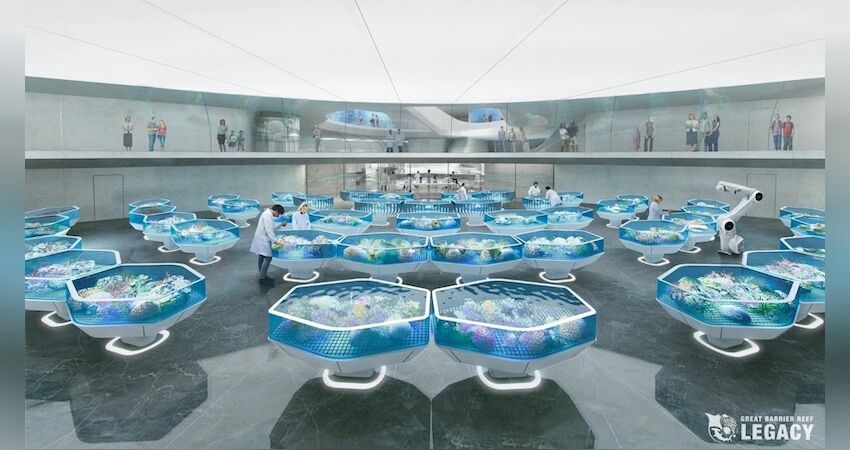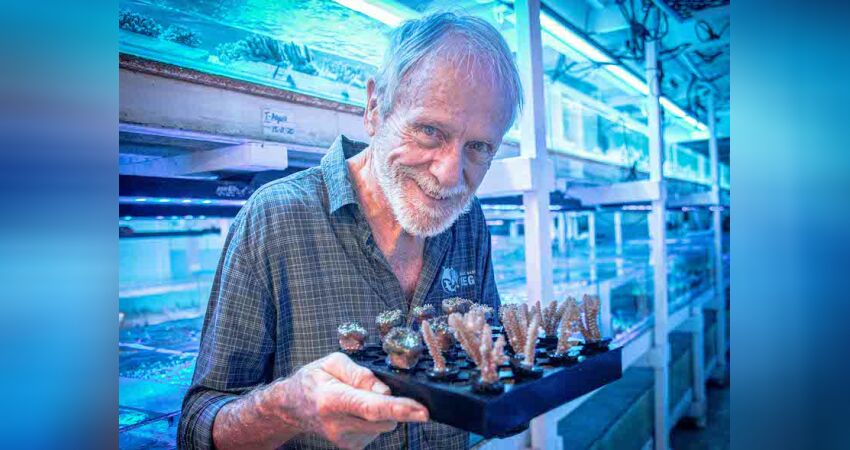Living Coral Biobank project starts in Australia

Copyright by Great Barrier Reef Legacy
Because the project is really worth a quick message to the hobby aquarists :-) the text is translated from English by Reefbuilders. As you know, Charly Veron has already helped us a lot with the construction of our database in the encyclopaedia and contributed a lot of photos.
You may have heard of a seed bank, but have you ever heard of a Living Coral Biobank?
A relatively new Great Barrier Reef Legacy initiative is taking place in tropical north Queensland, Australia. Right on the doorstep of the Great Barrier Reef, where they aim to use coral farms, public aquariums and eventually reef builders, scientists like you are coming home to keep all 400 odd species of (rock) coral found on the Great Barrier Reef. and eventually all coral species worldwide in our own systems like an interconnected "coral ark".
The project is well underway with a large number of GBR species already entered into the database and held in facilities that are partners for the project such as Cairns Marine, a well known and long standing aquarium collection company, Sustainable Reefs, a fully operational corporate coral farm in Cairns dedicated to dissection and propagation, and the Cairns Public Aquarium currently building a large room dedicated solely to this project. The project is gaining decent momentum and attracting the attention of philanthropists eager to help advance the project in various ways.
Jedes einzelne Korallenstück, das Teil des Biobank-Projekts ist, wurde vor Ort von Dr. Charlie Veron, dem „Paten“ der Steinkorallen, identifiziert. 
After collection, the colony is processed into offshoots and placed on a specially designed offshoot plug with a built-in RFID chip. The chip is linked to a database that contains a range of information including the GPS location of the parent colony, water analysis at the time of collection, photos of the dive site, genetic analysis of the coral tissue and other invaluable data.
These coral fragments could end up being an extremely important living representative of a Great Barrier Reef species or another coral species. Since the parent colony and any offshoots made from it will have interconnected RFID chips, the information database can be shared with scientific or educational institutions around the world, along with a piece of this coral that you, as a hobbyist, could one day provide research or reef restoration efforts.
People who would like to participate as citizen scientists can access the database to upload growth, colour, water chemistry and other information required for their offshoot to track changes (if any) in an unprecedented way. From now on, through Great Barrier Reef Legacy, you can register your intention to host a coral fragment for the Biobank Project in your own aquarium as soon as it becomes available, or even sponsor a fragment in the programme if you cannot physically host one .
This is an exciting new facet of reef aquatics that gives us all another reason to focus on water quality and aquarium husbandry skills to ensure you protect your biobank to pass on coral reefs to future generations.
Link: https://greatbarrierreeflegacy.org/
There is also a video on this (English-language)
How do you like this article?
Info
Author

Bookmark
Comments
Topics
Similar articles
- Das neue TRITON Support Forum ist online
- The Sangokai Reefers Podcast Episode 14 - Good Old Times! The special episode with Robert Baur
- Bubble King Supermarin 100 mit Red Dragon X DC 12V LIGHT
- Pictures and stories from marine aquaristics - by Helmut Strutz and Thomas Leithold
- NEU: Roller Clean 4
- 20-30 % on Maxspect pumps - but only until 11 September 0 o'clock
- Großes Grillen, Caipirinhia, super Korallen und tolle Vorträge am kommenden Wochenende
- New on the market: The EVO 501 and 1001 skimmers from Aqua Medic
- Der Blick zu unseren Nachbarn: Reefitalia.net
- Aquarium systems - Part 1: The LINEA series from Giesemann
Comments To the top
Please register
In order to be able to write something yourself, you must register in advance.






